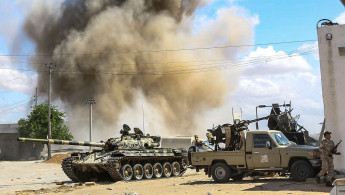Nearly 150 killed in battle for Libya's Tripoli, WHO says
The clashes have displaced more than 18,000 people, according to the latest figures from the United Nations Office for the Coordination of Humanitarian Affairs.
Fighting broke out as Haftar's forces sought to take control of Tripoli from loyalists of the internationally-backed Government of National Accord (GNA) which is based in the capital.
The rising number of casualties has prompted the World Health Organisation (WHO) to deploy surgical teams "to support Tripoli-area hospitals as they cope with the influx of trauma cases", the UN agency wrote on Twitter.
WHO urged "all parties to exercise restraint and avoid causing collateral damage to hospitals, ambulances and health workers".
In addition to ground fighting, both pro-government forces and Haftar's self-styled Libyan National Army (LNA) carry out daily air raids and accuse each other of targeting civilians.
The resulting casualties have left health facilities in "critical need of assistance", according to the United Nations refugee agency.
"The situation on the ground continues deteriorating and number of casualties soaring," UNHCR tweeted.
At least eight ambulances have been hit during clashes in the southern outskirts of the capital, as both sides have defied international calls to halt the fighting.
More than 3 million books have also been destroyed after rockets hit ministry of education buildings during fighting between the rival factions, the UN confirmed.
The airstrikes on the schools and education ministry warehouses also destroyed exam results, the UN humanitarian agency OCHA said on Monday.
The UN Libya mission UNSMIL warned "the bombing of schools, hospitals, ambulances and civilian areas is strictly prohibited", noting it was documenting such cases to present to the UN Security Council.
The LNA launched the offensive to seize Tripoli, the headquarters of the UN-backed Government of National Accord, led by Fayez al-Sarraj.
Hafter has vowed to unify the country after years of chaos following the 2011 uprising that toppled longtime dictator Muammar Gaddafi.
He has led previous campaigns against Islamist militias and other rivals in eastern Libya, and has received support from the UAE, Egypt, Saudi Arabia, Russia and France.
Follow us on Twitter: @The_NewArab





 Follow the Middle East's top stories in English at The New Arab on Google News
Follow the Middle East's top stories in English at The New Arab on Google News
![Both Hamas and the Palestinian Authority welcomed the ICC arrest warrants [Getty]](/sites/default/files/styles/image_330x185/public/2024-11/GettyImages-2178351173.jpg?h=199d8c1f&itok=TV858iVg)

